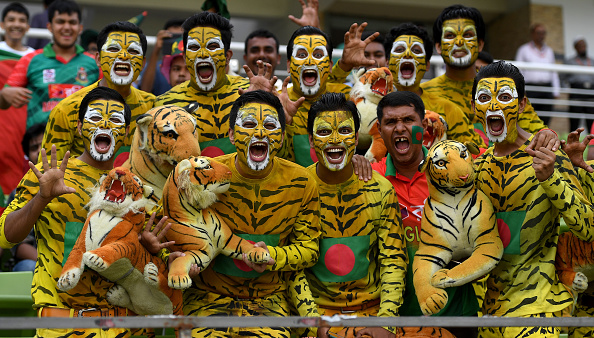The greatest underdog story of our generation: Bangladesh Cricket
On the fertile landscape formed by the estuary of the River Ganges, beyond the social-political instability, poverty and lack of proper education - there was hope. Hope pinned on a cricket team to present them with some happiness amidst all the difficulties that life had bestowed on them.

They wanted to see their beloved team conquer a foreign game with elan. Amidst the boundless expectations, Bangladesh cricket thrived to see their dawn of success. The day arrived in Dhaka, albeit a little later than they would have liked, as the Bangla Tigers thrashed the Englishmen to pull off their first Test victory over the nation that invented “the gentleman's game”.
To begin with, Bangladesh was always a country that did well in the limited-overs format and even punched above their weight to produce some major upsets although at times far and few. Be it the 1999 World Cup victory over Pakistan or defeating India and South Africa in the 2007 ICC Cricket World Cup. Till now Bangladesh was considered a country that was able to create a wave, but once in a blue moon. Consistency was far from imagination.
Gradually, the limited overs cricket started embedding itself into the psyche of the country, but success in the whites remained as a nebulous entity. Apart from the odd draw, Bangladesh couldn’t make any ripples for a long time. Some victories against Zimbabwe and West Indies followed but these successes had more to do with the inability of the opposition rather than their own heroics. But things gradually started to change for the South-Asian nation and how!

 © Getty
© GettyWalking down memory lane we arrive at 2000 where Aminul Islam, the then skipper of the Bangladesh side that defeated Pakistan in the 1999 World Cup, was playing in the Southern Premier League in Hampshire. He got a call from the Bangladesh Cricket Board to attend a press conference at Lord’s, where the minnows from the Indian sub-continent were to be officially announced as a Test playing nation. Jagmohan Dalmiya, the then president of the ICC fought with other countries to reward Bangladesh with Test status for the extraordinary effort the nation had put in. As the news broke out back home, it sparked wild celebrations throughout the country. A 9-wicket loss to India didn’t matter as the team had finally earned the right to play cricket with the big boys.
The year 2014 will always be remembered as a watershed year for Bangladesh cricket. They drew a game against Sri Lanka and defeated Zimbabwe 3-0 in a Test series. In limited-over games, they lost a few close matches - by two runs, 13 runs, and twice by three wickets to Sri Lanka; by three wickets to Pakistan; by three wickets to West Indies. With a string of good performances, Bangladesh visited Australia for the ICC Cricket World Cup 2015 where they managed to enter the Quarter-finals for the first time in their history. The cricketing world started taking Bangladesh seriously and the results in subsequent months astonished anyone who did not believe the hype that the country had created. Series victory over cricketing superpowers like South Africa(2-1), India(2-1) and Pakistan(3-0 in ODIs and 1-0 in T20s) at home were no longer just upsets. There was more to it than just a one-off win. Bangladesh had already started taking giant strides towards success. Their victory was inspirational not only for the people of the country but for the entire global cricketing fraternity as the minnows started believing in themselves and an equilibrium was established among the top tier teams.

 © Getty
© GettyResults in the limited-overs games added to their determination and promise. They started believing that they could pull off victories over the “big boys” more often. Mashrafe Mortaza was able to create an aura around himself by inspiring the younger lot. The arrival of Coach Chandika Hathurusinghe in 2014, was another important event as the Sri Lankan took them to greater heights. With a brigade of countrymen to support them unconditionally, Bangladesh sent a message across that they belonged in the big league. The likes of Tamim Iqbal, Shakib Al Hasan, Mashrafe Mortaza, Mushfiqur Rahim, Sabbir Rahman and Mahmudullah, have been on the forefront to bring about this massive change in Bangladesh cricket.
As if the stars were aligning in a special direction, the rise of Mustafizur Rahman has also synchronized with the rise of Bangladesh cricket. His contribution to the success of Bangladesh in the 50-over game has been well documented. His shoulder injury made him unavailable for the series against England, but that in turn paved way for the emergence of another star, Mehndi Hassan.
After a 7-wicket haul in his debut Test against England, Mehndi Hassan took 12 wickets in the second Test to snatch victory from the jaws of defeat. The 2016 Under-19 World Cup star, proved to be a menace for the English side as the series ended at 1-1.

 © Getty
© Getty“I will remember this day for a very long time. When I was part of the team that played Bangladesh’s inaugural Test 16 seasons ago, I never thought we would see this day. Nothing tastes sweeter than winning a Test and that too against a top-quality side such as England. A win of this magnitude is bound to give us confidence when we tour New Zealand in the coming weeks for a Test series,” former skipper Habibul Bashar told Times of India after the victory.
Habibul may be correct in saying that this series can give Bangladesh confidence ahead of New Zealand series, but the reality is that playing away from home is going to be a big challenge. The roadmap is there and the path appears to be rosy. So, if they put their right foot forward as they have over the last two summers, success abroad might not be a distant dream anymore. With staunch fans to support them and passion embedded in their blood, the future seems bright for Bangla cricket.

Comments
Sign up or log in to your account to leave comments and reactions
0 Comments